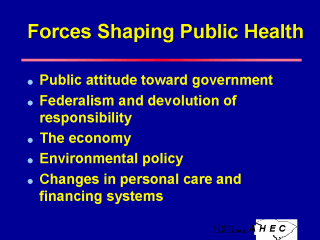| front |1 |2 |3 |4 |5 |6 |7 |8 |9 |10 |11 |12 |13 |14 |15 |16 |17 |18 |19 |20 |21 |22 |23 |24 |25 |review |
 |
Public attitude toward government: If government is seen as a burden, or as a negative force, people are less inclined to use structural approaches to improve the publicís health, and more inclined to believe that private and voluntary efforts will suffice. The problem is that private and voluntary efforts are neither obliged to include all members of the community, nor to include them on an equitable basis. Federalism: The country regularly cycles through phases of centralization and decentralization mirroring the conflict among the founding fathers about government (the Federalist Papers). We have been devolving responsibility for program design and implementation to more local levels in recent years. The Economy: During recessions and tight economic times, available tax revenues are decreased, and public health must compete for resources with all other governmental services. Likewise, private dollars for charitable purposes decrease. Environmental attitudes: When we exploit the environment for economic or pleasure reasons, we seem less inclined to take the necessary steps to protect individuals from health threats that may arise. When there is an interest in environmental conservation and protection, it may be easier to include attention to limiting or controlling those threats. Changes in personal care system: Changes in the personal care and health care finance systems produce changes in the need for emergency health support, and billable services may supplement other public health funding. Managed care is one such impact. |
| front |1 |2 |3 |4 |5 |6 |7 |8 |9 |10 |11 |12 |13 |14 |15 |16 |17 |18 |19 |20 |21 |22 |23 |24 |25 |review |